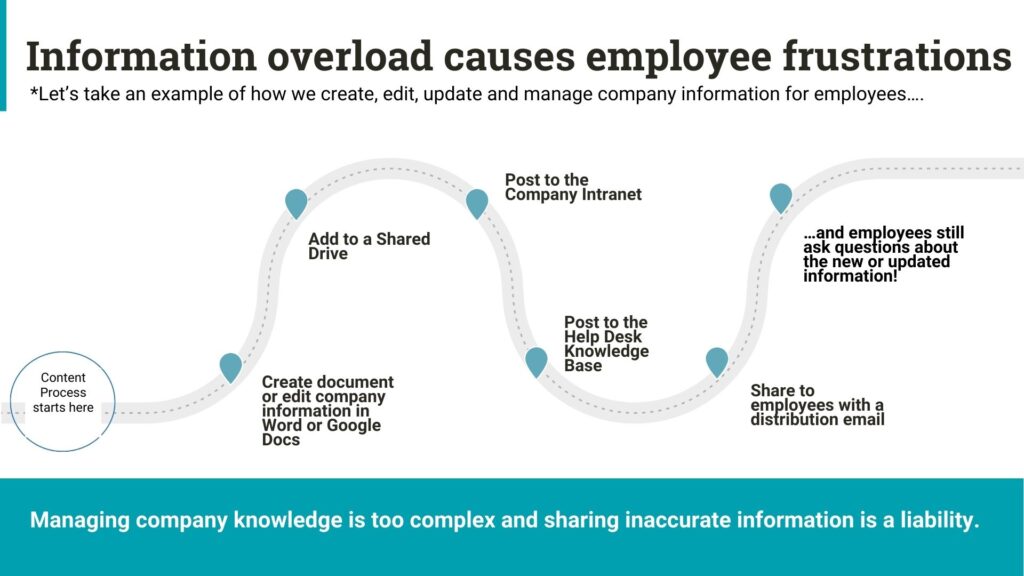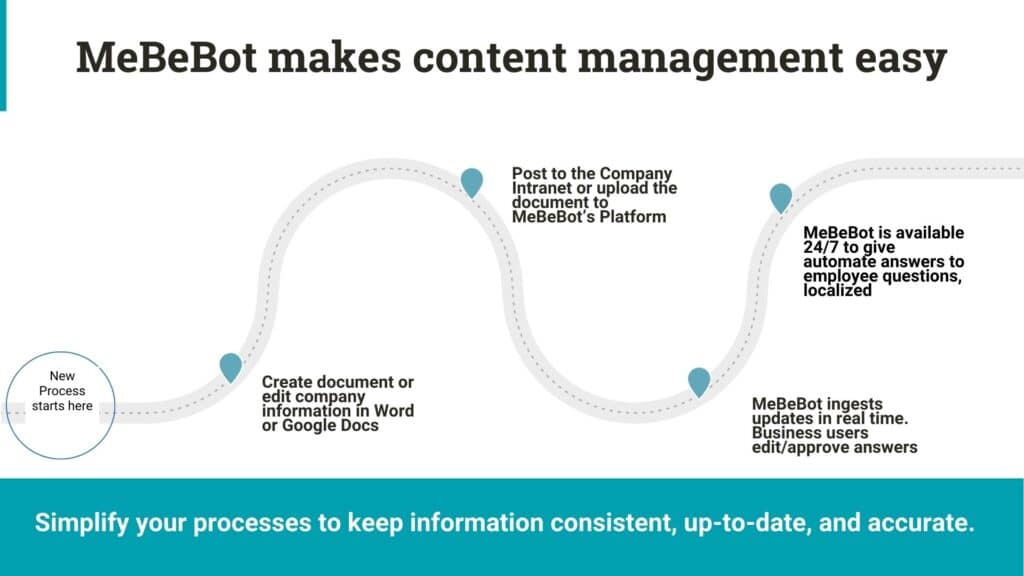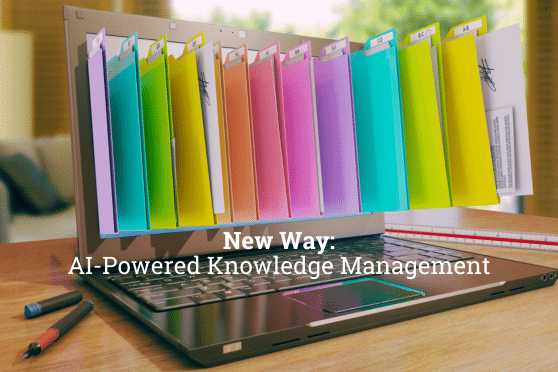Knowledge management, an integral component of modernized HR service delivery and compliance-driven HR operations. This comprehensive article delves into the history, processes, and benefits of implementing a knowledge management system within your organization. Learn how it can streamline operations, enhance employee productivity, and provide accurate responses to employee queries. Explore how MeBeBot’s AI platform simplifies content management, driving operational efficiencies.
History of knowledge management.
Knowledge management traces its origins to Peter Drucker in the 1980s — a period marked by the dawn of the digital age. As the internet emerged as a transformative force, Drucker and his contemporaries recognized its potential to revolutionize how businesses organize and use information. This realization prompted Drucker to coin the term “knowledge management,” foreseeing its pivotal role in shaping future business strategies.
The 1990s heralded the formalization of knowledge management as a strategic discipline, with thought leaders like Tom Davenport and Larry Prusak pioneering its principles. Their seminal work, “Working Knowledge: How Organizations Manage What They Know,” provided a comprehensive framework for understanding and implementing knowledge management practices. Companies began actively investing in information management systems, recognizing the competitive advantages that effective knowledge sharing could offer.
As we entered the 21st century, knowledge management assumed even greater importance in the context of the digital revolution. The exponential growth of digital information and the complexities of the global marketplace underscore the necessity for effective knowledge management strategies. Today, knowledge management systems have become indispensable tools for facilitating collaboration, fostering innovation, and driving continuous improvement in organizations worldwide.
As businesses navigate an increasingly complex and dynamic landscape, the ability to harness and leverage knowledge remains a cornerstone of success.
Traditional knowledge management process.
The traditional knowledge management process, as outlined, presents a cumbersome and reactive approach to handling company information. Characterized by disjointed steps and fragmented systems, it often leads to frustrations among employees due to information overload and inefficiencies in accessing critical data. This antiquated approach not only hampers productivity but also inhibits collaboration and innovation within the organization.

In this traditional process, information creation or editing typically begins in platforms like Word or Google Docs. Once created, documents are then stored in shared drives, posted on the company intranet, and added to the help desk knowledge base. Despite these efforts, employees still resort to asking questions about newly updated or unfamiliar information, highlighting the shortcomings of the process.
Moreover, the traditional approach to knowledge management suffers from sluggishness and a lack of agility. The time-consuming steps involved in gathering, organizing, and communicating knowledge can hinder the organization’s ability to respond promptly to evolving business needs. Additionally, information silos exacerbate the challenge of locating information efficiently, leading to duplicated efforts and reduced collaboration.
In contrast, modern knowledge management systems offer a paradigm shift towards efficiency, effectiveness, and proactivity. These systems provide streamlined processes for capturing, storing, and sharing knowledge, facilitating easy access to up-to-date information for all employees. Additionally, modern systems offer features tailored to enhance compliance-driven HR service delivery, including training material management, performance tracking, and audit capabilities. By leveraging these advanced tools, organizations can guarantee compliance while providing superior service to employees, ultimately fostering a culture of innovation and continuous improvement.
How to make knowledge management successful?
Making knowledge management work well is crucial for any organization, but it’s not always easy. According to Tom Davenport, a business expert, there are some big reasons it often doesn’t work out. Let’s break it down into three main points.
Firstly, break down those information silos. Some folks might want to keep what they know all to themselves to feel more important. Others might just not have the time or place to share what they know. Either way, if information isn’t written down and shared, it doesn’t help anyone.
Next up, make searching for information easier. Sometimes, info is all over the place in different apps, making it a real pain to find what you need. If it’s too hard to find what you’re looking for, you might just give up and ask a coworker instead.
Lastly, we’ve got to keep that information up-to-date. If we’re only using our knowledge management system to store old documents, it’s not much help when you need to find the latest info. We’ve got to make sure that everything is current and accurate so folks can trust what they find.
What is a knowledge management system (KMS)?
McKinsey Global Institute’s Report and the International Data Corp research reinforce the vital role of a knowledge management system (KMS) within organizations.
The McKinsey report states knowledge management systems reduce information search time by up to 35 percent. As well as boosts organizational-wide productivity by 20 to 25 percent. These statistics underscore the tangible benefits that effective knowledge management practices can bring to an organization’s efficiency and effectiveness.
In today’s dynamic business landscape, organizations are constantly challenged to effectively manage and leverage their collective knowledge to achieve strategic goals. This is where a knowledge management system (KMS) becomes crucial.
Imagine a digital nerve center within an organization, seamlessly capturing, storing, organizing, and sharing a wealth of knowledge and information. A KMS acts as this centralized platform, empowering employees with instant access to resources tailored to their specific needs. Collaboration thrives, and a culture of continuous learning and innovation takes root.
For HR departments, a KMS is indispensable for delivering compliant and consistent services. By providing quick access to relevant policies, procedures, and regulatory guidelines, HR professionals make sure that every interaction meets required standards. Moreover, AI-powered search engines within modern KMS platforms enhance user experiences, enabling quick and accurate information retrieval.
Moreover, insights from the International Data Corp highlight the staggering costs associated with inadequate knowledge sharing. Fortune 500 companies collectively lose a staggering $31.5 billion annually due to knowledge silos and information bottlenecks. This emphasizes the importance of fostering a culture of knowledge sharing and collaboration within organizations. By harnessing the power of knowledge, organizations can unlock new levels of productivity and competitiveness in today’s knowledge-driven economy.
Exploring 7 different sources of knowledge.
Each type of knowledge management system offers unique benefits, catering to different needs within an organization. From organizing documents to facilitating collaboration, these systems play a vital role in efficient business operations.
- Document / Content Management Systems are like digital filing cabinets for company documents. They make finding documents easy, help with regulatory compliance, and improve workflow. By adding passwords and backup procedures, document security is increased.
- Database System is a computer tool that allows people to store, analyze, and work with data. Databases are organized to make information easy to find. Data stored in databases is very secure because the system prevents tampering.
- Data Warehouse gathers data from across an organization and is great for reporting and analysis. They hold both current and historical data and turn it into useful information.
- Data Lake is a central storage space for large amounts of data. It can handle data of any size and type while keeping it secure.
- Intranet is a private network for a company. It provides easy access to information, enhancing collaboration and social networking within the organization. However, it can also pose security risks if accessed by unauthorized personnel.
- Internal Knowledge Base is a collection of searchable information meant to help with problem-solving, answering questions, and providing guidance.
- Collaboration System uses technology to help people communicate and share documents digitally. These systems are useful for solving communication issues, reducing paperwork, and enabling telecommuting.
Highlighting 4 use cases for HR knowledge management.
In various situations involving HR service delivery, a knowledge management system proves incredibly useful, bringing substantial benefits to companies. Let’s take a look at some key ways it is applied:
Helping New Employees: When new team members join, a knowledge management system acts as a central hub for all things related to onboarding. This means they can quickly find answers to their questions about company rules, job training, and more, all in one convenient place. By making information readily available, new hires feel confident and ready to contribute from day one.
Keeping Everyone in the Loop: Good communication is vital in any organization. A knowledge management system provides a dedicated space for internal communication and updates. Employees can ask questions, share ideas, and get the latest news, promoting teamwork and knowledge sharing. With everything in one place, there’s less confusion and fewer distractions, leaving everyone more time to focus on their work. Plus, important announcements reach everyone quickly and easily, making sure everyone stays informed and aligned with the company’s objectives.
Providing Efficient Support: Operations teams benefit from a knowledge management system by having instant access to the information they need to support employees. Whether it’s explaining HR policies, solving IT issues, or helping with administrative tasks, a comprehensive knowledge base provides fast and accurate responses. This not only boosts employee satisfaction but also lightens the workload for HR and IT support, allowing them to concentrate on more strategic responsibilities.
Empowering IT and HR Teams: The HR / IT knowledge management system keeps everyone up-to-date on the latest developments in IT and HR. Employees can easily access information about new software, security measures, policy changes, and benefits. This not only enhances efficiency but also encourages ongoing learning and growth throughout the organization.
How AI HR with Guardrails simplifies content management?
Gone are the days of cumbersome processes and scattered information. With MeBeBot, HR professionals can effortlessly create or update documents using familiar tools like Word or Google Docs. Then, they can seamlessly upload these documents to MeBeBot’s AI Platform or post them directly to the company’s intranet.
Once uploaded, MeBeBot’s AI with Guardrails takes over, providing real-time ingestion of updates. Business users can then easily review and approve answers, keeping information accurate and compliant. Plus, MeBeBot is always on standby, ready to provide automated answers to employee questions 24/7.

But the benefits don’t stop there. MeBeBot goes a step further by sharing new information with personalized push messages in popular collaboration tools like Microsoft Teams or Slack. This makes sure that employees stay informed and engaged, no matter where they are.
By centralizing HR content and streamlining the creation and updating process, you save valuable time and boostsproductivity. Its intuitive interface empowers HR professionals to manage content without any technical expertise, while built-in compliance checks provide accuracy and mitigate legal risks.
Moreover, MeBeBot provides invaluable insights into employee content usage through its analytics feature. This allows HR professionals to tailor content to meet employee needs effectively, ultimately driving engagement and satisfaction.
With MeBeBot’s AI HR knowledge management comes operational efficiencies.
MeBeBot’s AI Platform for employee support and engagement opens the door to a spectrum of advantages for People / HR Operations and employees alike:
Time Savings
By automating manual tasks like information retrieval and answering employee queries: MeBeBot frees up 1-2 hours per HR/IT team member. This alleviates the burden of sifting through queries and interruptions, allowing for more focused work.
Cost Savings
Each manual email message, or help desk ticket saved translates to an average of $25 in cost savings. MeBeBot mitigates both the internal team’s time expenditure and the productivity loss when employees seek solutions independently.
Accuracy and Consistency
With a 90% accuracy rate, MeBeBot provides employees receive reliable information, preventing potential future conflicts stemming from incorrect guidance. Moreover, content updates happen in real-time, making sure information remains current.
Personalized Messages
Delivering tailored push notifications yields a high response rate of 80-90%, enhancing engagement and efficiency in addressing employee needs.
Instant Feedback and Usage Data
MeBeBot provides instant insights into queries and usage patterns, with 60-70% response rates to feedback queries. This enables proactive adjustments and optimizations to enhance the user experience.
Faster Employee Response Time:
By harnessing AI-powered knowledge management, employees gain faster access to accurate information, facilitating quicker issue resolution and bolstering employee satisfaction.
MeBeBot’s AI-powered knowledge management empowers organizations to enhance HR service delivery, reduce costs, and boost employee productivity. These benefits cascade into heightened employee satisfaction, financial savings and improved customer experience.

ABOUT AUTHOR
Bennett Sung
Working in HR / Work / and Recruiting Tech for 17+ years. Bennett collaborates with leading solution providers including ADP/VirtualEdge, Bullhorn/Jobscience, Koru/Cappfinity, AllyO/HireVue, Humanly, and now MeBeBot.
